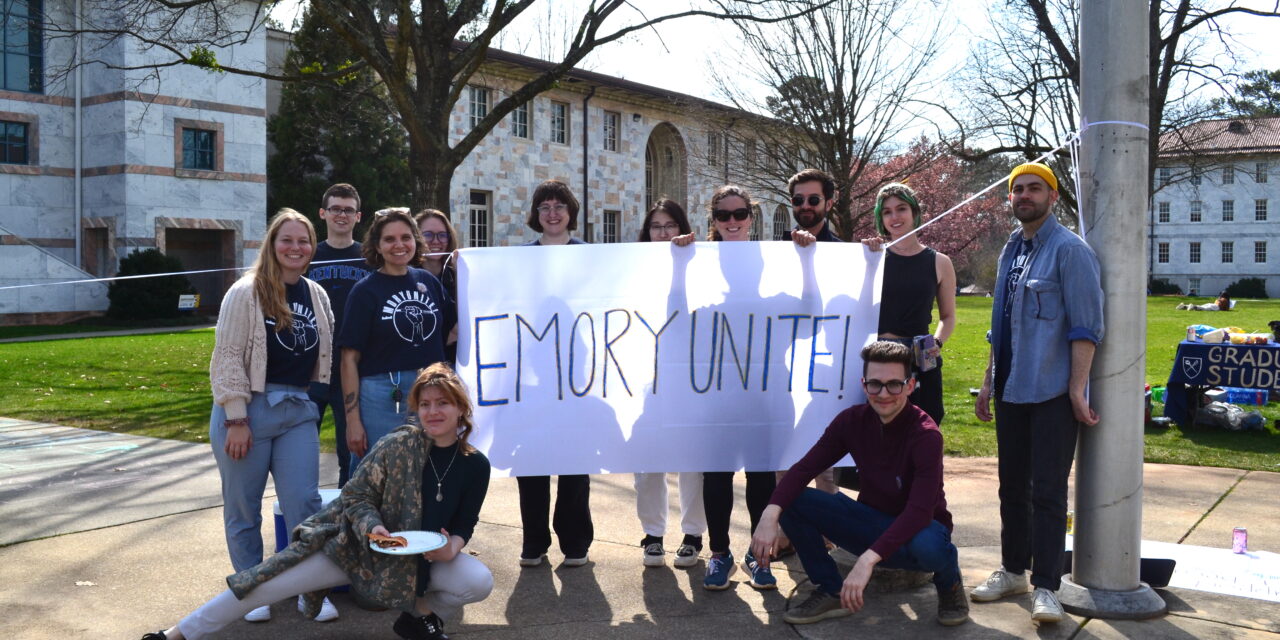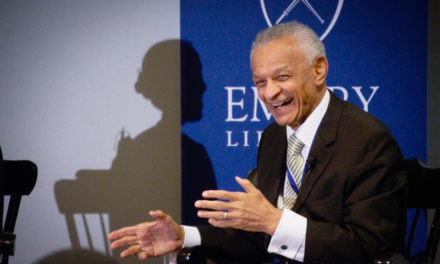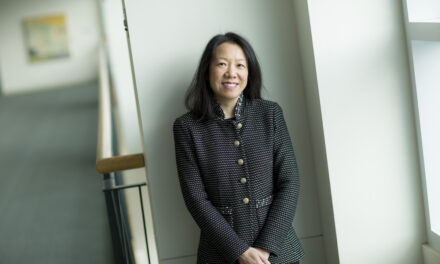Laney Graduate School Ph.D. students will vote on whether to unionize on Oct. 17 and 18.
This is the latest step in EmoryUnite!’s efforts to represent Ph.D. students as an official majority union recognized under the National Labor Relations Board (NLRB). The group, which has been operating as an unofficial union since 2016, entered negotiations with the University and the NLRB earlier this month to decide on an election date.
The NLRB filed a Stipulated Election Agreement and Notice of Election on Sept. 15. Laney Dean Kimberly Jacob Arriola announced the election dates in an email to Laney Ph.D. students on Sept. 20.
“We will remain unwavering in our commitment to deliver high-quality graduate education regardless of whether students collectively decide to be represented by a union,” Arriola wrote.
Students employed in a unit position this semester are eligible to vote, unless they graduate or withdraw from their program by election day. About 1,700 Ph.D. students will be eligible under these terms, according to EmoryUnite! organizer Elijah Ullman (25G).
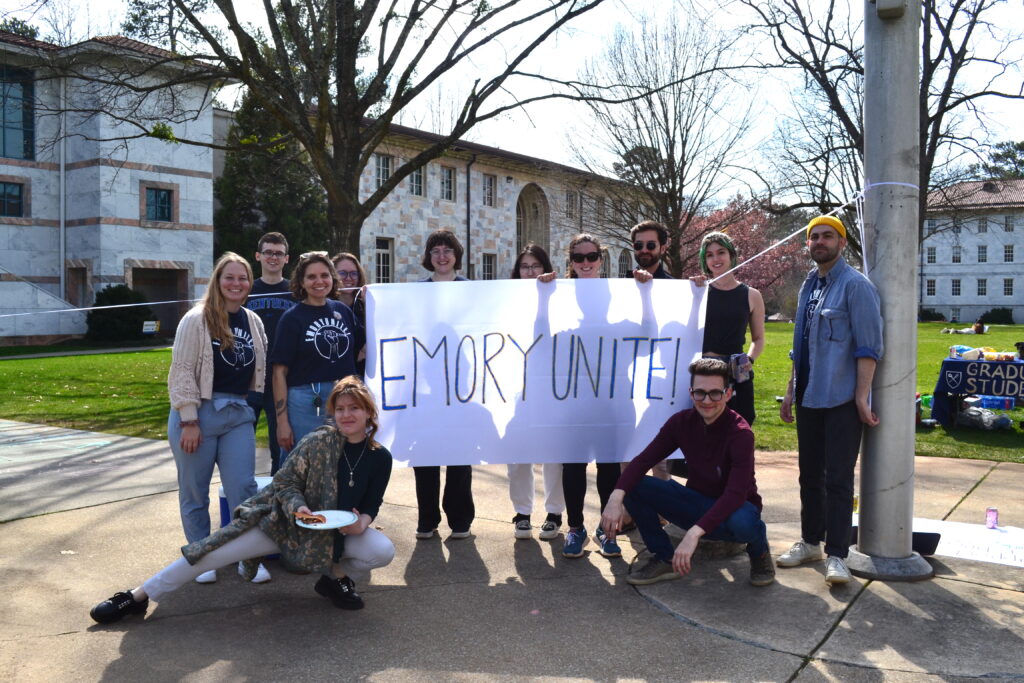
EmoryUnite! members gather on the Quad in February to collect signatures to qualify to petition for a unionization election. (Soph Guerieri/Staff Photographer)
Additionally, students who are doing instructional or research services for Emory outside of Metro Atlanta, such as those working in labs across state lines, will be able to request a mail ballot, which the NLRB will mail out on Oct. 6. Ullman said students who are out of town for other reasons, such as those attending conferences or visiting family, will not be eligible to vote.
Students in the biomedical engineering program, a joint program between Laney and the Georgia Institute of Technology, will be eligible to vote if they have an advisor at Emory, but will not be eligible if they have an advisor at Georgia Tech. Most public employees, including those at public universities like Georgia Tech, are not allowed to engage in collective bargaining or strikes in Georgia.
Students can expect to learn the results of the election — which will determine whether Emory will be required to bargain with them — by mid November.
Ullman said he is “optimistic” going into the election, pointing to the wave of graduate student unions forming over the past couple of years. Over 30 student worker bargaining units have emerged since 2021.
“We’re buoyed … by those successes,” Ullman said. “We are hopeful that we’ll win.”
Ph.D. students have been historically paid below Atlanta’s living wage, a trend that continued after the University officially increased most Laney Ph.D. students’ stipends by 6% on Sept. 1. Laney stipends now average at $36,637.53, or about $3,053.13 per month, which falls below Atlanta’s living wage of approximately $39,375 for one adult working full-time without kids.
Before the increase, Laney stipends averaged at $34,595.63 during the 2022-23 academic year, with an average monthly take-home pay of $2,534 after taxes. Many students struggled to make ends meet with the stipend, according to Ullman.
A cost of living survey of doctoral students conducted by Laney’s Office of Senior Associate Dean and obtained by the Wheel found that 44.4% of respondents relied on the stipend as their only source of income. Single students relying fully on the stipend spent an average of $1,254.93 on rent and $444.24 on food each month, adding up to nearly 70% of their monthly take-home pay. Additionally, students living in a single household reported spending an average of $2,335 per month, leaving only $199 left over from their monthly take-home pay, according to the survey.
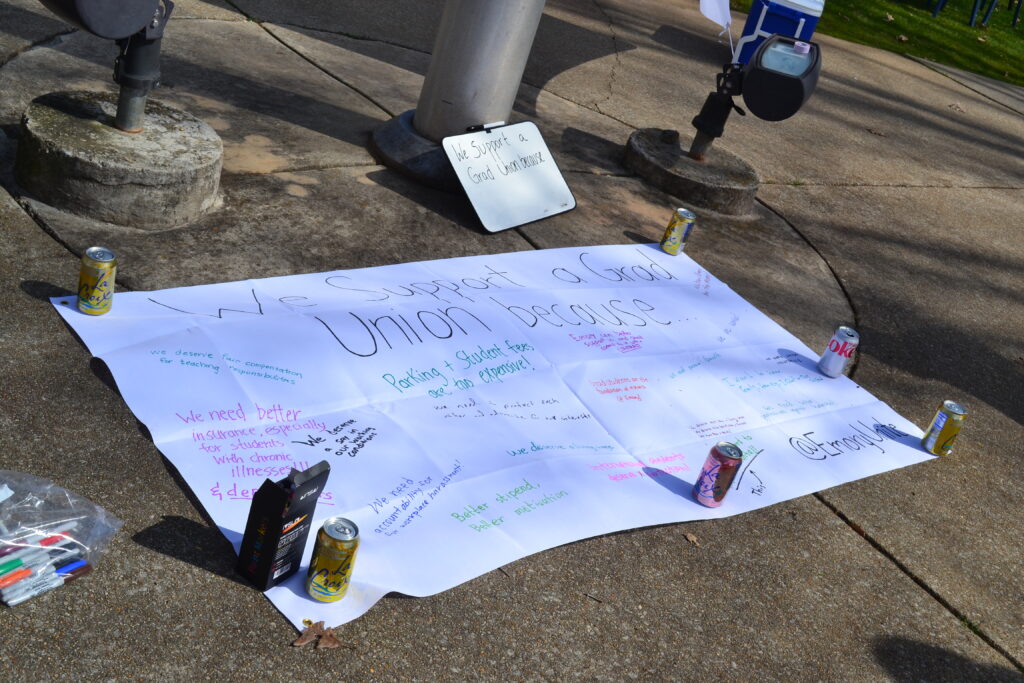
A sign displays hand-written messages supporting EmoryUnite! (Soph Guerieri/Staff Photographer)
Low pay is a major concern of EmoryUnite!, which is demanding a stipend that matches the living wage of Atlanta, according to Ullman. EmoryUnite!’s goals also include adding a parental stipend, improving harassment reporting mechanisms and reducing student fees.
“We want everyone to be able to come here, not just those who can weather financial storms,” Ullman said.
EmoryUnite! initially filed for unionization with the NLRB on Aug. 25. The University publicly responded to the filing in an Aug. 30 press release and has since worked with involved students through negotiation efforts, as required under the National Labor Relations Act.
Assistant Vice President of University Communications wrote in an email to the Wheel today that it is important for every eligible Ph.D. student to vote.
“The decision of whether to be represented by a union is of critical importance as it will impact all Ph.D. students, and possibly future generations of Ph.D. students, at Emory,” Diamond wrote.
The three polling stations, which are based on students’ academic program and are located in the Woodruff Health Sciences Center Library B65, Robert W. Woodruff Library 314 and Atwood Chemistry Building 320, will be open from 9 a.m. to 1 p.m. and 3 p.m. to 7 p.m. Students who wish to cast their vote must bring a valid ID.
The election is six years in the making. When EmoryUnite! formed in 2016, early members reported facing resistance from University administration and ultimately halted their efforts for official majority unionship in 2017, instead opting to form a voluntary membership unit with less bargaining power. In August 2022, Ullman helped reignite the movement to earn recognition as a majority union under the NLRB.
Ullman said securing an election date is “phenomenal.”
“It’s a recognition of all the hard work everyone before us and that are with us now have done,” Ullman said. “We’re unable to meet our means by going through the traditional routes and so students are finally looking to do something material that can change the circumstances.”
Correction (9/21/23 at 7:28 p.m.): A previous version of this article stated that about 17,000 Ph.D. students will be eligible to vote. In fact, about 1,700 will be eligible.
Correction (9/21/23 at 11:41 p.m.): A previous version of this article stated that there were still ongoing negotiations deciding if students in the biomedical engineering program would be eligible to vote. In fact, it was decided that students with an advisor at Emory University will be eligible to vote, while students with an advisor at the Georgia Institute of Technology will not be eligible to vote.
Madi Olivier is from Highland Village, Texas, and is majoring in psychology and minoring in rhetoric, writing and information design. Outside of the Wheel, she is involved in psychology research and works for the Trevor Project. In her free time, you can find her trying not to fall while bouldering and watching Criminal Minds with her cat.

